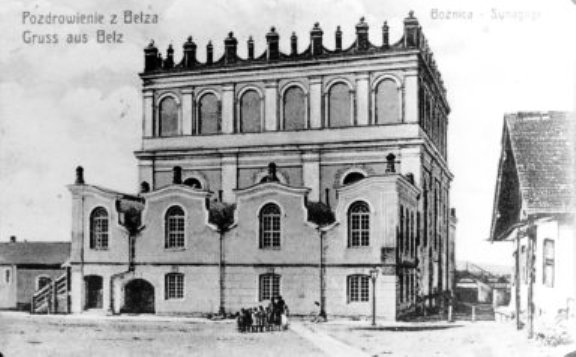Nash Holos: Belz

Belz is a small city in the Lviv province of Western Ukraine near the border with Poland.
The Ashkenazi Jewish community in Belz was established in the 14th century. The Ashkenazi are a Jewish ethnic division which coalesced in the Holy Roman Empire around the turn of the first millennium. They established communities in central and eastern Europe, and grew to become one of the largest Jewish sects. In 1931 they accounted for 92 percent of the world’s Jews. The Holocaust devastated the Ashkenazi and their Yiddish culture. Persecution continued under the Soviet Communists. The regime banned Hasidism, and its followers were executed or exiled to labor camps.
Belz came under Polish rule in the 14th century, when the town was granted rights under the Magdeburg law. Some three centuries later, in 1665, the Jews of Belz received equal rights and duties.
In the early 19th century, the town became home to a Hasidic dynasty. The dynasty was founded by Rabbi Shalom Rokeach, also known as the Sar Shalom. He served as the first Belzer Rebbe from 1817 to 1855.
In addition to leading his Hasidim, he defended the beleaguered Jews of his district to the governor.
In a famous exchange, the governor of the district invited him to his office and said, “Do you know that I am the second Haman?” The Sar Sholom replied, “Luck was not on the side of the first one, either”. The governor was so impressed by the Rebbe’s firm stand that he promised to put an end to the Jewish persecution.
A great Torah scholar, Rabbi Shalom Rokeach personally helped build the city’s large and imposing synagogue, dedicated in 1843. It could seat 5,000 worshippers and had superb acoustics.
When Rabbi Shalom died in 1855, his youngest son, Rabbi Yehoshua Rokeach became the community’s next spiritual leader, or Rebbe, until 1894.
Hasidism in Belz grew during Rebbe Yehoshua’s tenure and the tenure of his son and successor, Rabbi Yissachar Dov Rokeach, who served from 1894–1926.
At the beginning of World War One, Belz had sixty-one hundred inhabitants. There were sixteen hundred Ukrainians, nine hundred Poles and thirty-six hundred Jews.
With the outbreak of World War Two, Belz was thrown into turmoil. From 1939 to 1944 the town was occupied by Nazi Germany. Many Jews of Belz fled to the Soviet Union, under the German–Soviet Treaty of Friendship, Cooperation and Demarcation, a follow up to the infamous Molotov–Ribbentrop Pact.
In May 1942, there were fifteen hundred and forty local Jewish residents and refugees in Belz. On June 2, 1942, 1,000 Jews were deported to the Polish town of Hrubieszów. From there they were sent to the Sobibór extermination camp. In September of that year another 504 Jews were deported to Hrubieszów, after they were no longer needed to work on the farms in the area.
Rabbi Yissachar Dov’s son and successor, Rabbi Aharon Rokeach, escaped from Nazi-occupied Europe to Israel in 1944. He re-established the Hasidut first in Tel Aviv and then in Jerusalem.
“Belz, Mayn Shtetele” is a Yiddish song about Belz. It is a moving tribute to a happy childhood spent in a shtetl. The song has special significance in Holocaust history. A 16-year-old playing the song was overheard by an SS guard at Auschwitz. The guard forced the child to play it repeatedly to calm Jews being herded into the gas chambers.
After the war Belz reverted to Poland until 1951 when it passed to the Soviet Union. Since 1991 it has been part of independent Ukraine.
Today there are no Jews in Belz. However, there is a new synagogue and mykva—a ritual bath, and the remains of the old cemetery.
The last known Jewish burial was in 1940. No other towns or villages used this unmarked Hasidic cemetery. The cemetery has special sections for women, rabbis and Cohanim, Jews with direct patrilineal descent from the Biblical Aaron. There are no known mass graves in Belz.
The municipality owns the property specifically designated for the Jewish cemetery. The cemetery boundaries are smaller now than 1939 because of agriculture. Frequently, organized Jewish group tours or pilgrimage groups and local residents visit. For the past several years, Jewish individuals abroad have been cleaning and restoring many of the gravestones with loving care.
Narrated by Renata Hanynets, Lviv
Listen to the program here.
Ukrainian Jewish Heritage is brought to you by the Ukrainian Jewish Encounter (UJE), a privately funded multinational organization whose goal is to promote mutual understanding between Ukrainians and Jews. Transcripts and audio files of this and earlier broadcasts of Ukrainian Jewish Heritage are available at the UJE website and the Nash Holos website.



















